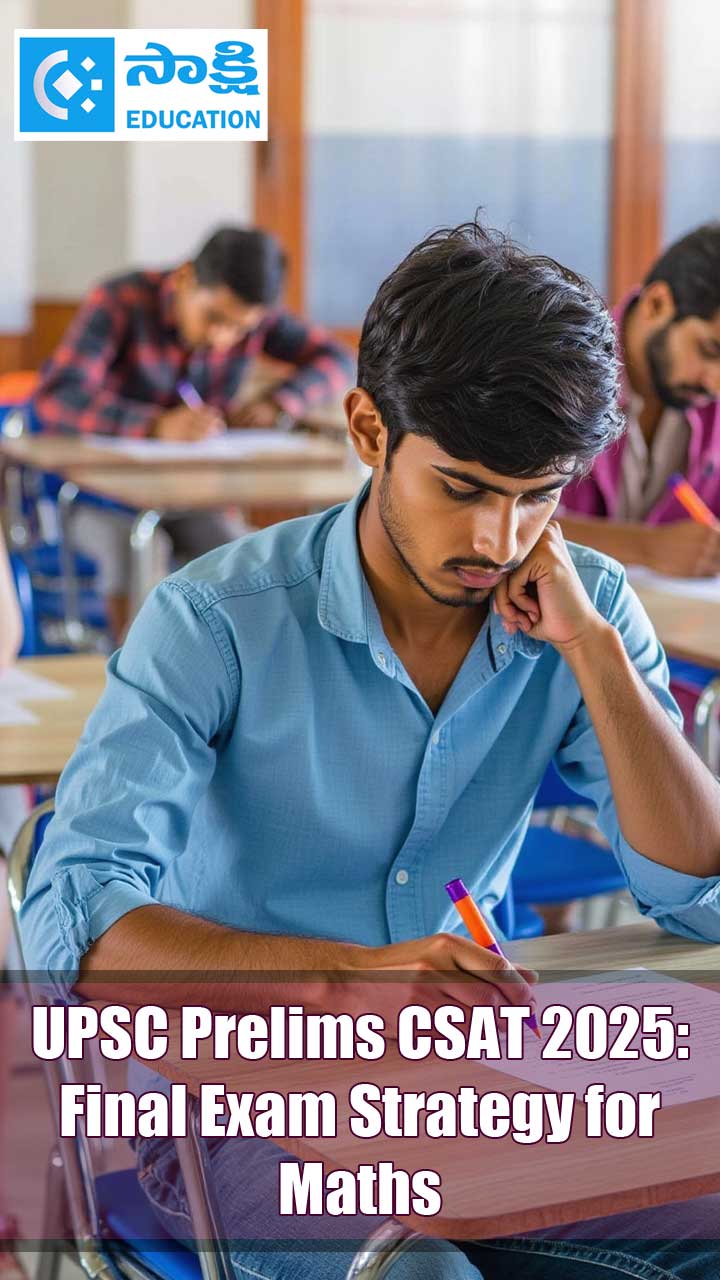India A Rising Global Power
Sakshi Education
I. Introduction:
1. India a Core State in the Emerging Global Order:
India's External Affairs Minister Pranab Mukherjee projected India as a core state in the emerging global order. He emphasised that India's role would be crucial for ensuring and maintaining long-term peace, stable balance of power, economic growth, and security in Asia.
2. Greater Recognition of India's Stabilising Role in the Region:
In the present time, there is a greater recognition of India's stabilising role in the region born out of its restraint, economic dynamism and potential, the history its civilisational engagement and its role as a firewall against destabilising ideas and influences, according to Mr. Mukherjee.
3. Rise of India and China has Resulted in the Resurgence of Asia:
The new wave of globalisation had begun to accelerate the distribution of power in the international system, according to Mr. Mukherjee. The rise of India and China had resulted in more than the resurgence of Asia. The consequences of rapid growth in China and India were being felt in Latin America and Africa, according to the External Affairs Minister.
4. India and China Crucial Elements of an Asian Century:
Referring to the Late Chinese leader Deng Xiaoping's assertion that there could be no Asia-Pacific or Asian Century without India and China forming crucial elements of such an architecture, Mr. Mukherjee stressed that India is one of the important legs of the Asian juggernaut along with China, Japan and Indonesia.
5. Political and Economic Resurgence of Asia Accompanied by the Rise of Powerful Economic Forces:
India's External Affairs Minister pointed out that the political and economic resurgence of Asia had been accompanied by the rise of powerful economic forces unleashed by globalisation and the trend towards regional integration.
6. Only a Pluralistic Security Order Would have the Legitimacy of Dealing with the 21st Century Challenges:
Mr. Mukherjee favoured a pluralistic security order in Asia, based on a cooperative approach to security. Such a polycentric order would be accommodative of the diversity of the region. He also suggested that only such an order, working through a network of cooperative structures, would have the legitimacy of dealing with the challenges of the 21st century.
II. Steps Towards India Becoming a Regional Power by 2020:
The approach towards India becoming a regional power by 2020 can be divided into five broad categories as follows:
1. Flexible Foreign Policy
2. India's Economic Interests
3. Creating a Stable and Cooperative Atmosphere in the Region
4. Enhancing Security Cooperation
5. Working Towards a Multipolar World Order
1.Flexible Foreign Policy:
Changing the Mindset is the Biggest Challenge to India's Foreign Policy:
The External Affairs Minister Pranab Mukherjee said that the biggest challenge to India's foreign policy lay in changing its own mindset. He stressed that the India strategic community must come to terms with India’s increasing weight in the international system. Currently India is not a bystander to the actions of other powers, according to Mr. Mukherjee.
Flexible Tactics Needed to Adapt to Changing World Order:
Prime Minister Manmohan Singh said that India could not be tied down to its past. It needed flexibility of tactics, depending on the changes the world over.
2. India's Economic Interests:
Economic Interests and Energy Security - a New Thrust to the Foreign Policy:
The Prime Minister pointed out that access to markets, sources of energy, investment and advanced technologies posed new challenges to India's external relations. These challenges had led India towards new thrusts in its foreign policy. There were new directions in India's approach towards major economic partners, the Asian neighbourhood and other developing countries.
Most Important Objective of India's Foreign Policy - Constructive Agenda for Economic Development:
Mr. Mukherjee said that the most important objective of India's foreign policy was to set a constructive agenda for economic development. India's objective is to have sustained economic growth in the range of 9 to 10 per cent during the 11th Plan and higher growth level in the 12th Plan. The foreign policy would aim at achieving that objective, according to Mr. Mukherjee
India's Trade with the Countries of the Region has Increased Since the Initiation of the Look East Policy:
Since 1990 when the Look East policy was initiated, India's trade with the countries of the region has grown from 8.1billionto67.5 billion and the share of trade with these countries in India's global trade has increased from 19.4 per cent to 28.2 percent, according to Mr. Mukherjee.
India can Gain by Taking Advantage of the Knowledge Explosion in the World:
Dr. Singh pointed out that India has to flourish and survive in a world where there is an explosion of knowledge. There are challenges and opportunities. Therefore it is essential the India's thinking population should be able to analyse these developments objectively.
3. Creating a Stable and Cooperative Atmosphere in the Region:
Foreign Policy Must Help Create an International Environment Conducive to India's Development:
Dr. Singh felt that there could be no disconnect between India's domestic capabilities, national aspirations and external policies. He emphasised that foreign policy must help create an international environment conducive to India's rapid social and economic development.
India Faces the Challenge of Creating a Stable and Cooperative Atmosphere in the Region:
The Prime Minister pointed out that India faces a turbulent neighbourhood and it was a foremost challenge to create a stable and cooperative atmosphere in the region that will allow India to concentrate on tackling the problems at home and in the region.
Need for Deeper Understanding of the Factors Contributing to the Rise and Fall of Nations:
The Prime Minister opined that the current turbulence in the Islamic world required deeper analysis. This also applied to the rise of China as a major global power. India can learn from China's economic development. Dr. Singh also stressed that the diplomats must have a deep understanding of the factors which contribute to the rise and fall of nations and civilisations.
India and China Engaged in a Constructive Dialogue:
Mr. Mukherjee told the Summit that India and China were currently engaged in a constructive dialogue. Both countries have recognised that there is enough space for developing together, growing together, not at the expense of each other but independent of each other.
4. Enhancing Security Cooperation:
Enhancing Security Cooperation Critical to Building Lasting Economic Ties:
The External Affairs Minister said that an environment of security, predictability and peace was essential for people to prosper, business to flourish and development to take place. Thus, enhancing cooperation in the field of security was critical to India's larger efforts aimed at building lasting economic ties, according to Mr. Mukherjee.
Working Purposefully and in Cooperation with Other Nations to Combat the Threat of Terrorism:
Mr. Mukherjee pointed out that the principal threat to peace and stability in the world flowed less from wars between nations and more from the threat of transnational terrorism. He emphasised on the overarching importance of working purposefully and in cooperation to combat the menace of terrorism.
India Playing Its Part to Meet the World Wide Security Deficit:
It was pointed out that India is playing its part to meet the current phenomenon of a worldwide "security deficit". India was enhancing its defence preparedness through several means including a nuclear doctrine of minimum deterrence. However, India's current defence expenditure is at a modest 2.5 per cent of its GDP and was not eroding developmental priorities, according to the Defence Minister.
India Willing to Assist Maritime Security Along the Straits of Malacca:
Mr. Mukherjee offered to help safeguard the strategic Malacca Strait and backed an East-Asian security initiative to enforce compulsory pilotage of the channel against pirates and maritime terror. He stressed that India was willing to assist in the project and share its expertise in maritime security with nations of the region.
Indo-US Strategic Partnership an Aspect of India's Defence Diplomacy:
India's current strategic partnership with the US, as exemplified by the 2005 framework agreement on defence cooperation, was part of India's defence diplomacy.
ASEAN and India have a Convergence in Security Perspectives:
Southeast Asia was the starting point of India's "Look East" policy, according to Mr. Mukherjee. India and the ASEAN nations have a convergence in security perspectives, a common interest in peace and stability in the region and in the maintenance of security of sea lanes and communication.
Major Security Threats in Asia Could be Resolved Through Cooperation Between India, China and Pakistan:
Defence experts at the Summit pointed out that issues like Afghanistan, Iraq and Iran continue to dominate the security and defence agenda. The other security threats include terrorism and proliferation of Weapons of Mass Destruction (WMD). It is felt that the solutions to these security issues could be based on a positive interaction between India, China and Pakistan, especially with regard to terrorism and proliferation.
5. Working Towards a Multipolar World Order:
Constructing a Genuinely Multi-polar World Order:
Today the world is in a state of flux with the core achievements of the UN being undermined by unipolarism. In such a situation, India’s foreign policy faces the challenge of engaging the US, the world’s sole superpower, while, at the same time, acting in concert with other nations and other powers to build an international system that is genuinely multi-polar, according to analysts.
Need to Inject Political Content into India’s Strategic Partnerships with Big Powers:
Despite the gains made in recent years, India’s relations with the US, Russia, China, Japan and Europe were all below potential, according to Mr. Mukherjee. The Government would endeavour to inject real political content into the strategic partnerships that India has with all major powers
Published date : 02 Oct 2009 03:34PM













